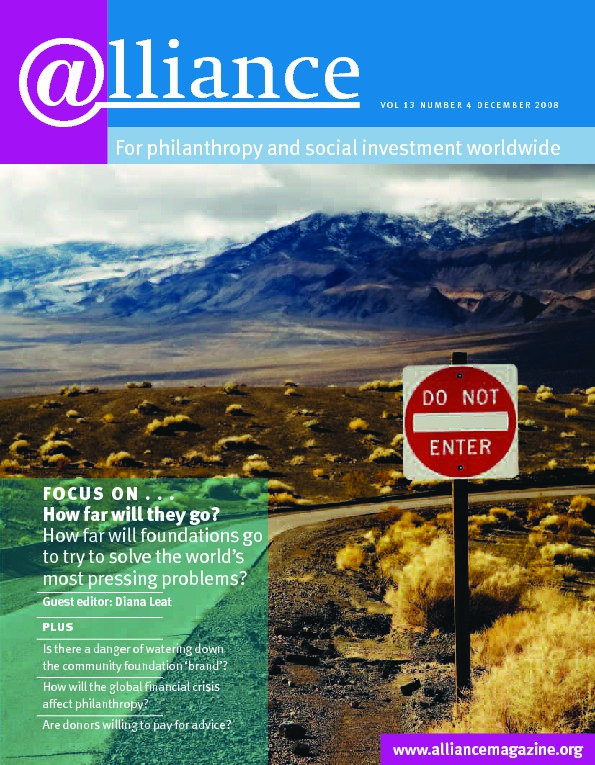In September 2007, Alliance ran a special issue on climate change in which Stephen Heintz, President of Rockefeller Brothers Fund, described the work that RBF has been doing for some years in the USA. The Carnegie UK Trust recently asked me to find out what trusts are doing in the UK, especially in relation to the social justice consequences of climate change, and what more they might do in the future. My report, called Responding to the Rooftops (in the same speech in which Al Gore used his ‘Inconvenient Truth’ phrase, he also referred to scientists ‘virtually screaming from the rooftops now’), suggests a very mixed picture.
Some trusts have thought deeply about these issues, and some have been making relevant grants or developing other initiatives for some time – though these tend to be modest relative to the scale and urgency of the threat. Often the impetus for involvement by a foundation has come from trustees. Many foundations are largely unaware of what other foundations are doing in this area. There is a consensus around the idea that ‘the main issue now is the politics, not the science or technology’. There is also a strong sense that the kinds of NGOs with which progressive UK foundations have good links are not, in general, heard on the subject of climate change in places where their voices would be influential.
There are at least two significant reasons why these ‘non-environmental’ voices need to be heard. First, unexpected voices may be more influential. Explicitly environmental NGOs do make their voices heard on these issues, but what they have to say is perhaps somewhat predictable. Organizations working with, for example, older people, migrants, young people and poor people need to speak about the effects of climate change on their client groups. Foundations could reflect on which are the key social change NGOs that need to be heard in the climate change debates. How can this be enabled to happen? How far will it be necessary to help NGOs see the climate change dimension to their social justice concerns?
Second, there is a perceived need to influence the intellectual climate on these issues, something that requires a wider range of inputs than just those from ‘the usual suspects’. One interviewee pointed out that there is no single think-tank in this area of public policy. Of course, there are plenty with an interest in the area, but they also do other things. The strength of this comment is perhaps illustrated by the fact that when public policy shifted towards biofuels in the late 1990s, there was no critique – in the UK at least – that pointed out the predictable consequences in terms of land use and effects on food prices for the poor.
There is an inherent tension in democracies between the need to do what is right and the risk of punishment at the ballot box, especially, as in this case, when what is right may involve calling on people to pay more, or use less, or make other lifestyle changes that are at least initially unpopular. As one interviewee pointed out, ‘This is a campaign for less freedom rather than more, for less abundance rather than more; a campaign against ourselves.’ One role for foundations is to support work that builds public pressure for change and so creates the political space in which it is possible for a democratically accountable government to take action that might otherwise be politically damaging.
The report suggests that foundations need to go on making grants via grants programmes that are not too ‘closed off’ which enable them to support those who are already active in the field and who will not survive without the kind of ‘no strings’ funding that foundations alone can offer. Foundation grants and initiatives would also be relevant in areas such as housing, transport, fuel poverty and migration. NGOs working in these and other areas may need help to understand the relevance of their experience, and funding to ensure that their core operations are secure over the critical period – many experts believe that we have only until the end of 2016 before we are beyond the point of no return in terms of climate change (see, for example, http://www.onehundredmonths.org).
Further, it is important to use trust money to help build resilient communities which will be strong enough to avert the catastrophic consequences of climate change in areas such as public health, public transport and car-sharing, local power generation, road and bridge operations and maintenance, water supply and wastewater treatment.
Steven Burkeman is an independent consultant, based in the UK, working mainly with foundations and human rights organizations. Email burkeman@gn.apc.org
For more information
To download Responding to the Rooftops, go to http://tinyurl.com/6af64a



Comments (0)